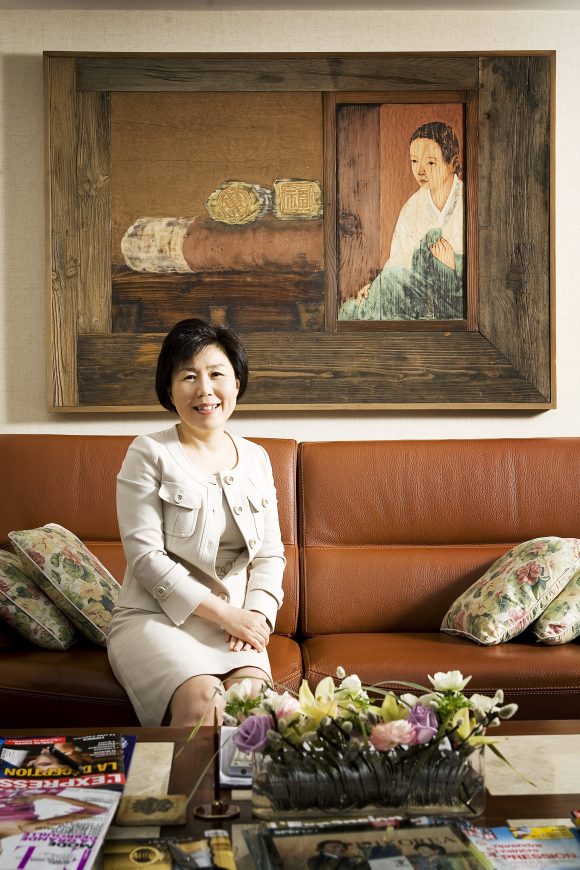A 21st Century Formula
Just like everything else, communications too must be reassessed to adapt to the disruptions of the 21st century. Su Aziz speaks to Professor Choi Jung-wha from Hankuk University of Foreign Studies in Korea. This was an article features in In Focus magazine issue 5.
‘Both methods and contents of communication have changed a lot in the past 30 years, thanks to new and improved technology that’s being developed every day,’ says 63-year old Choi Jung-wha, a professor at Hankuk University of Foreign Studies in Korea. ‘Then, we didn’t have any form of mobile phones nor was there internet that made emails and instant messaging possible. Now, we can do just about anything on smartphones that are more of a mini-computer that we carry around with us everywhere, making it possible to communicate with people instantly. This quick and easy access to communication plays a vital role today, both in our personal and business lives.’
From the many interviews Professor Choi has held, they pretty much say the same thing about her: that she’s a crusader of marketing Korea to the rest of the world – its culture, heritage, language, lifestyle and food. In fact, she has written over 30 books on the subjects. On the other hand, she also wants to globalise Koreans’ perspective. Professor Choi’s decades-long effort to bridge Korea and the world has earned her the Yeongsan Diplomat Award in 2018.
Having been a professor at Hankuk University for three decades where she taught interpretation and translation of French, Korean and English, Professor Choi founded a non-profit public diplomacy organisation registered under the Ministry of Foreign Affairs, called CICI (Corea Image Communication Institute) in 2003. It was also the year Professor Choi was awarded France’s highest award, Legion d’Honneur. She was the first Korean woman to receive the honour.

A legion of noteworthy individuals such as diplomats, corporate executives, scientists and journalists have been CICI members or graduated from its programs. Although CICI organises year-round networking events, it’s CICI Korea Image Awards that has garnered a lot of esteem. The award is a recognition of those who contribute significantly towards promoting the image of Korea globally. Past awardees include renown YouTubers Korean Englishmen who showcase Korean cuisine to their more than three million subscribers worldwide. It has been said that the ‘list of CICI awardees reads like a who’s who for prominent Koreans and foreigners who have made great contributions’ to the promotion of Korea.
Globalising Koreans
‘Communication is a two-way street,’ begins Professor Choi. ‘While I originally started CICI to promote Korea as well as Korean culture to the world, and focused more on showing Korea to foreigners, it was also vital that the flow of communication wasn’t just one-way. In order to promote Korea effectively, Koreans also need to understand and communicate with other cultures, playing a more active role to become citizens of the world. This not only applies to Koreans, but to everyone in the world.’
Recognising how the use of internet and growth of social media interconnects our world more than ever, Professor Choi advises, ‘We all must learn to respect and listen to each other to prosper together. I hope more Koreans become more open to learning and accepting other cultures. Last year, I published the book Global Etiquette which offers basic guidelines of proper etiquette and some easy English expressions that can be used in certain settings. Through this book, I hope to introduce and explain etiquette that many Koreans may not know or didn’t understand, perhaps due to our country’s long geographical ethnic isolation.’
Communication Power of K-pop and K-drama
CICI was born out of the need to put Korea on the world map. Having lived in France for a decade since 1978, Professor Choi discovered just how invisible Korea was and often was asked if she hailed from China, Japan or even Thailand, instead. Fast forward to the 20th century and the unstoppable rise of K-pop, K-drama and today, K-beauty products, Korea has become the apotheosis of modern lifestyle. Thus, one of the candidates considered for CICI Korea Image Awards 2020, is… (drum rolls) …BTS.
The seven-piece K-pop group needs no introduction. ‘We’re still looking at candidates and BTS is one of the most mentioned potential candidates. The group received top social award at the Billboard Music Awards two years ago and that was merely the beginning of their amazing journey. The seven of them were the first K-pop group to speak at the UN and this happened last year. As a rule though, awardees must attend the CICI Korea award ceremony to receive the award in person, so we shall see,’ explains Professor Choi.
‘I believe K-pop and K-dramas most effectively show Korea’s modern-day lifestyle, and not only through their songs or videos. Many people who become fans of K-pop singers and K-drama actors decide to learn the Korean language. They even visit Korea to personally experience our culture,’ Professor Choi continues.
‘K-pop and K-dramas have a certain quality about them that is uniquely Korean. Both genres have gained much popularity in many Asian countries for years now. What with BTS playing a huge role in the global music industry, more Westerners are also becoming more interested in K-pop and K-dramas,’ explains Professor Choi.
‘I briefly mentioned this before, but I believe it’s worth mentioning again: many people who show interest in K-pop and K-dramas start learning the Korean language, as well. Around a decade ago, only fans from the Asian region visited Korea to know more about our country and culture. Now, Europeans and Americans do, too. Korean courses have been added in many schools worldwide, with the rise in demand,’ she adds.
An interest in Korean language, Professor Choi believes, stems from the wish to learn more about Korean culture. Thus, leading many to visit Korea for first-hand experience. ‘Even if the fans aren’t interested in learning the language, they’re usually interested in learning more about other aspects of Korean culture, such as our society, psychology, clothing, food and more.’
Communication in the 21st Century
Professor Choi believes that culture acts as a sturdy bridge between countries and no two countries can have the same culture, ‘But we can compare, respect and admire them, even collaborate with them. In today’s globalised world, communicating through your culture will play a key factor for successful branding.’ Therefore, ‘cultural communication’ sets the direction for 21st century communication.
Next, of course, comes technology. Its omnipresence forces CICI to focus on the digital world. ‘The popularity of social media platforms has been soaring and I believe it’ll continue to do so for a long time,’ she speculates. ‘I recently saw an article that said the average daily social media usage worldwide in 2018 was 136 minutes [per day, which is a minute more than the previous year]. People are also becoming more interested in mobile content rather than static photos and texts.’ And that’s why CICI is focusing more on this and plans to utilise the likes of Instagram and YouTube. ‘It’s difficult though, with the lack of financial resources, as we are a non-profit organisation. But thankfully, many of our supporters have been lending their support and offering guidance. Sometimes, even technological support as well.’
Also, these social media platforms are certainly a way to target the younger generation. ‘In fact, our last major annual event, the Culture Communication Form CCF 2019, focused on content creators,’ Professor Choi adds. ‘In this rapidly changing digital age, we’ve got to make sure to stay on top of the changing trends. This will be vital in managing inventory. Also, have a “signature” or “slogan” that’s uniquely the brand’s that is easy to remember and leaves a lasting impression. No matter how good your product may be, if it doesn’t grab the interest of the consumers, it’s of no use. And last but not least, be open to receiving feedback from customers. Openness to receiving feedback, even if it’s critical, can go a long way to maintaining the brand’s image.’
Last Words
‘Ultimately, I hope people worldwide will know and see Korea’s true image as it is today and see it as a place they’re comfortable visiting,’ says Professor Choi. ‘I so clearly remember the first time I met a foreigner who knew about Korea. It was in 2003, when I was visiting a temple in Indonesia with my husband. A man we bumped into asked me if I was from Korea. I was so elated at the question, I burst out “yes!” and proceeded to ask how he knew. He replied that he was from Guus Hiddink’s country and that he had visited Korea the year before for the World Cup.’ As the whole world know, Korea has come a long way since then.
‘Those working in communications are responsible for letting people learn about things they didn’t know before, not just for making them understand,’ concludes Professor Choi. ‘21st-century communication requires global etiquette, national acumen.’
Professor Choi’s three tips for effective communication in the 21st century
- Firstly, be fast. Everything moves at a rapid pace now, with trends changing by the day. You have to be able to keep up with the changing world around you.
- Second, be truthful. It’s easy to create an image of yourself or an item online, but remember that the truth will show eventually.
Last but not least, be open to new ideas. In this digital age, you have access to new ideas and knowledge. Keep an open mind and you may be pleasantly surprised.
Main photo by Susanne Jutzeler suju fotografie from Pixabay.





